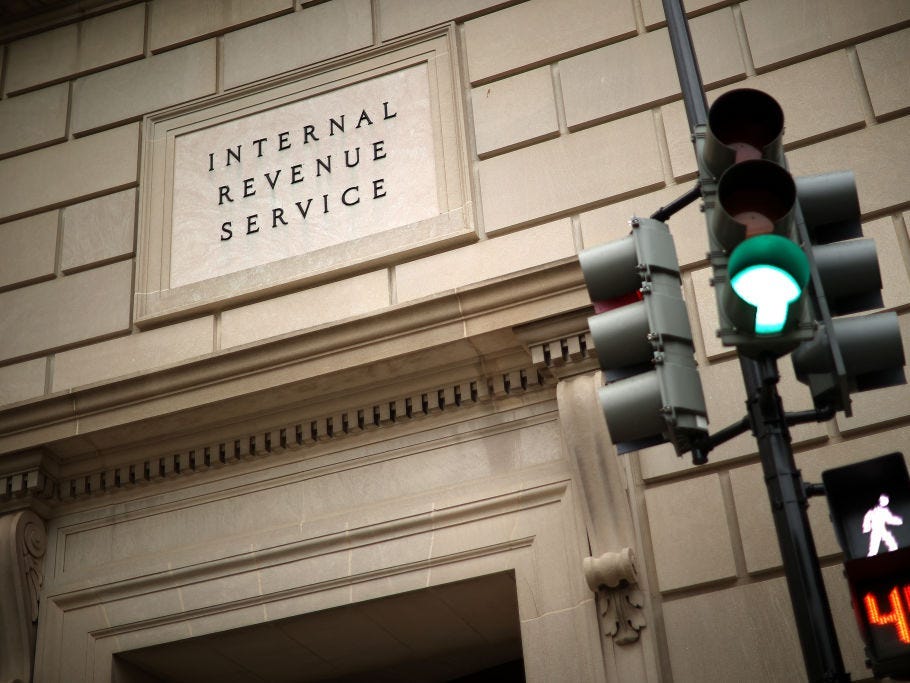
- Biden wants to boost IRS funding by $80 billion to hold the wealthy accountable, the NYT reports.
- That would be two-thirds higher than current funding but still leave as much as $900 billion uncollected every year.
- GOP lawmakers have previously opposed IRS funding boosts, but Democrats argue it's necessary.
- See more stories on Insider's business page.
As part of his plan to hold the wealthy and corporations accountable, President Joe Biden hopes to boost Internal Revenue Service funding by $80 billion over 10 years, The New York Times reported on Tuesday.
This new funding would be a two-thirds increase over funding levels from the past decade, but it could still leave hundreds of billions in taxes uncollected every year, Insider calculates, based on figures reported by the Times and comments from the IRS chief to Congress.
The Times cited an administration estimate that Biden's plan could raise at least $780 billion over 10 years to narrow the gap between what the US is owed and what it collects, while IRS Commissioner Charles Rettig told Congress earlier this month that $1 trillion or more in taxes could be going uncollected every year. Dividing that $780 billion by 10 years implies an average boost to collections of $78 billion per year – meaning about $922 billion of that hypothetical $1 trillion would still go uncollected.
Biden's boost to IRS funding would mean more audits of the ultrawealthy and a reversal of slashes that have taken the IRS budget down by about 20% since 2010, per the Associated Press. Sen. Elizabeth Warren has called for audits of the ultrawealthy every three years.
Since before Biden won last fall's election, the ultrawealthy have been preparing for more IRS scrutiny. In October, Insider's Taylor Nicole Rogers reported that they had begun planning to get ahead of potential tax changes. More recently, Biden's plan to raise the capital gains tax rate on Americans who make over $1 million per year has sparked anxiety, with Reuters reporting that wealth advisers are advising clients on the best ways to move around their money to avoid the potential hike, and Bloomberg reporting that some ultrawealthy Americans are in a "scramble" to move assets.
This new IRS funding is a key aspect of how the Biden administration hopes to pay for its infrastructure plans, including the $1.8 trillion plan Biden is set to officially unveil on Wednesday. It will include care-economy measures, like universal pre-K, paid national and family leave, and four more years of direct cash payments to parents.
The White House says it wants to fully pay for these and other programs with a series of tax hikes on the wealthiest Americans.
Mary MacGuineas, president of the Committee for a Responsible Federal Budget, said in a statement on Tuesday that "everyone should agree that taxpayers ought to pay what they owe under the law."
"While it's still unclear exactly how much revenue can be raised by closing the tax gap, the cost of inaction is high," MacGuineas said. "This is one of those rare public policy no-brainers. It shouldn't become a victim of partisan politics. The federal government should enforce the law."
While many Democratic lawmakers support stricter IRS enforcement - California Rep. Ro Khanna has introduced legislation specifically aimed at stricter auditing - Republicans opposed Biden's proposed corporate tax hikes and have pushed for IRS budget cuts, notably in 2011. For fiscal year 2014, Republicans recommended cutting President Barack Obama's IRS budget request by 30%.
Democrats and economists alike agree that stricter IRS enforcement is necessary - and overdue.
"This is the broadly right approach," Larry Summers, former director of the National Economic Council for Obama, told the Times. "Deterioration in IRS enforcement effort and information gathering is scandalous. The Biden plan would make the American tax system fairer, more efficient and, I'm confident, raise more revenue than official scorekeepers now forecast - likely a trillion over 10 years."
Dit artikel is oorspronkelijk verschenen op z24.nl